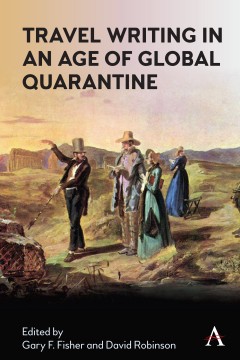Travel Writing in an Age of Global Quarantine
Edited by Gary Fisher & David Robinson
Foreword by M. Randal Owain
- About This Book
- Reviews
- Author Information
- Series
- Table of Contents
- Links
- Podcasts
About This Book
Travel Writing in an Age of Global Quarantine is an anthology of travel accounts, by a diverse range of writers and academics. Challenging conventional academic ‘authority’, each contributor writes, from memory during the Covid-19 lockdown, about a place they have previously visited, ‘accompanied’ by an historical traveller who published an account of the same place. As immobility is forced upon us, at least for the immediate future, we have the chance to reflect. Travel Writing in an Age of Global Quarantine presents opportunities to approach a text as a scholar differently. We break with the traditional academic ‘rules’ by inserting ourselves into the narrative and foregrounding the personal, subjective elements of literary scholarship. Each contributor critiques an historical description of a place about which, simultaneously, they write a personal account.
The travel writer, Philip Marsden, posits a fundamental difference between traditional ‘academic’ writing and travel writing in that travel narratives do not, or ought not anyway, begin by assuming a scholarly authoritative understanding of the places they describe. Instead, they attempt to say what they found and how they felt about it. The very good point we think Marsden makes, and the one this book tries to demonstrate, is that, as a matter of form, the first-person narrative has the ability to expose the research process: to allow the reader to see when and how a scholarly transformation takes place; to give the scholar the opportunity to openly foreground their own subjectivity and say ‘this is the personal journey that led me to my conclusions’; to problematize the unchallenged authority of the scholar.
Travel Writing in an Age of Global Quarantine challenges the idea of scholarly authority by embracing the subjective nature of research and the first-person element. We address a problematic distance between travel writing practice and travel writing scholarship, in which the latter talks about the former without ever really talking to it. Defining travel writing as a genre has often proved more difficult than it might seem, but Peter Hulme has suggested that it is ethically necessary for the writer to have visited the place described. Hulme asserts that ‘travel writing is certainly literature, but it is never fiction’. If this seems obvious, Travel Writing in an Age of Global Quarantine asks the reader to consider the idea that if visiting the place described is necessary for the writer to claim they have produced a travel account, might it also be necessary, or at least advantageous and valuable, for the writer of a scholarly critique of that account to have done the same.
Reviews
“This captivating collection of personal, historical essays engages in a dialogue with the past through the shared experience of travel. Evocatively written, Travel Writing in an Age of Global Quarantine raises questions about the relationship between time, space and belonging. Written in the context of lockdown due to the global pandemic, the authors grapple with the meaning of travel for themselves and the worlds beyond the locality that they are now prohibited from entering or passing through.”— Onni Gust, Professor, University of Nottingham, UK
“Necessity, they say, is the mother of invention: here the immobility imposed by the global Covid pandemic has birthed a set of fascinating, thought-provoking and genre-blurring essays. Spanning the local and the remote, the seemingly humdrum and the supposedly exotic, Robinson and Fisher's volume raises compelling questions about the multiple, intricate layerings and interweavings – of self, place and other, of past and present, of imagination, history and empirical experience – that inevitably shape both travel and travel writing.” — Carl Thompson, Reader in English Literature, University of Surrey, UK
Author Information
After a long career in the business world, David P. Robinson completed his PhD in History in 2020. His research interests have been, predominantly, concerned with how British travel in the late-eighteenth and early-nineteenth centuries helped to shape a British liberal-bourgeois identity.
Gary F. Fisher is an inter-disciplinary teacher and researcher in the Liberal Arts tradition, with interests ranging from the history of education to twentieth-century literature.
Series
Anthem Studies in Travel
Table of Contents
Foreword; Acknowledgements; Introduction, David Robinson and Gary F. Fisher; Chapter One ‘Off-Stage, A War’: Wuhan, 1938, Jonathan Chatwin; Chapter Two Frederic Lees in Varese Ligure, 1911, Ross Balzaretti; Chapter Three ‘A Rude People Subjected to No Restraint’: In Tanimbar with Anna Keith Forbes, Henry Forbes and So’u Melatunan, Will Buckingham; Chapter Four Sent to Coventry: A Journey Home?, David Civil; Chapter Five Bedouin Is a Place: Freya Stark’s Travel with Nomads, EmmaLucy Cole; Chapter Six With Wilkie in the West: Reading Wilkie Collins’s Rambles beyond Railways from a Cornish Perspective, Tim Hannigan; Chapter Seven Picturing Rome: Walking the Eternal City with the Last Victorian, Tory Hayward; Chapter Eight Su e zo per i ponti; or, How History Does Not Help, David Laven; Chapter Nine A Town Called Entropy: Boom and Bust in Arnold Bennett’s Potteries, Gary F. Fisher; Chapter Ten Travelling towards Transculturalism? Statues, Remembrance and Mourning in Bloemfontein, South Africa, Kate Law; Chapter Eleven Recollections of the King’s House, David Robinson; Chapter Twelve Occupying Her Time: Ginette Eboué, France, 1940–42, Sarah Frank; Epilogue, David Robinson and Gary F. Fisher; List of Contributors; Works Cited.
Links
Stay Updated
Information
Latest Tweets



